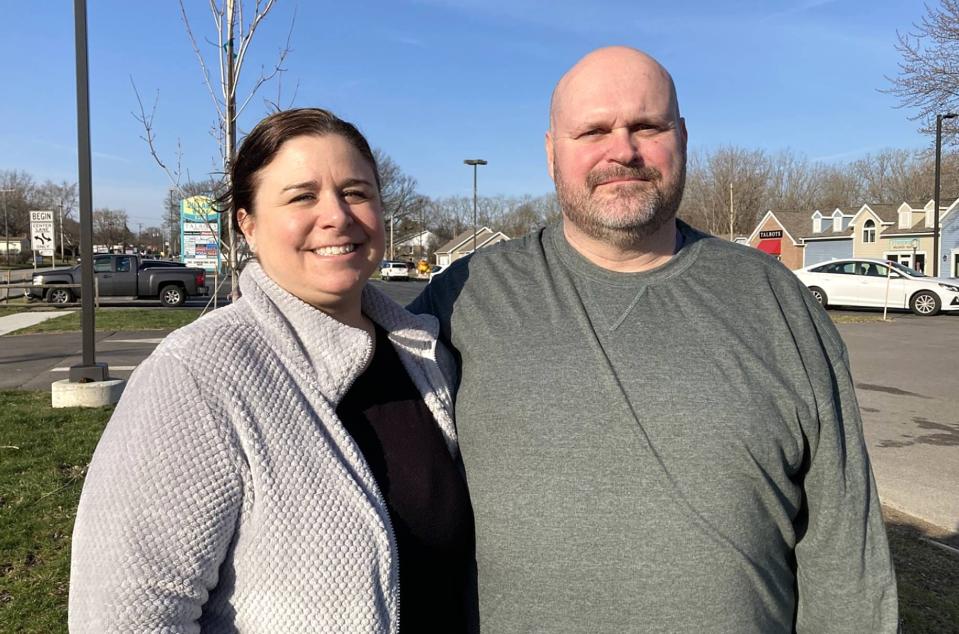Back in rhythm: Heart procedure helps Edinboro-area man feel his best 'in 3 or 4 years'
Dealing with both type 2 diabetes and atrial fibrillation made it twice as difficult for Matt Jewell to live a healthy lifestyle.
Medicine to control his abnormal heart rhythm slowed down his heart rate, which often made him feel tired.
"I work in the construction business, and the medicine made it hard for me to do my job," said Jewell, a 48-year-old Washington Township resident. "I tried working out, so I could lose weight and improve my diabetes. But it was so difficult."

Atrial fibrillation is the most common type of heart arrhythmia and cases of the potentially life-threatening condition are increasing. Up to 6 million Americans have been diagnosed with AFib and estimates are that as many as 12 million will have it by 2030, according to the U.S. Centers for Disease Control and Prevention.
People with untreated AFib are more likely to have a stroke, and their strokes tend to be more severe, the CDC reported.
AFib patients also tend to me much older than Jewell, who was 46 when he was first diagnosed.
"The median age is 71 and it's usually a disease of the elderly," said Dr. Madhurmeet Singh, the UPMC Hamot cardiologist who treats Jewell. "Maybe five times a year we see a patient with AFib in their 20s, 30s or 40s."
The cause for some AFib cases is unknown, though high blood pressure is a leading risk factor. Others include age, obesity, diabetes, heart failure, heart disease, hyperthyroidism and moderate to heavy alcohol use.
"We call it 'holiday heart' and occasionally see it with younger people who party all weekend and come into the ER on Monday," Singh said. "It's another reason not to binge drink."
Jewell has some of those risk factors, but he said doctors have never told him about a specific cause for his AFib.
He was diagnosed following a visit to his endocrinologist, who detected an abnormal heart rhythm. A cardiologist later diagnosed him with AFib, which is when the upper chambers of the heart don't beat regularly, and blood doesn’t flow as well as it should from the atria to the lower chambers of the heart.
"They prescribed me medication and I had a cardioversion," Jewell said, referring to a procedure commonly done to AFib patients where their heart is shocked back into a normal rhythm.
AFib medicine left Jewell feeling fatigued
Jewell's heart stayed in rhythm, though the medication left him fatigued. When his AFib returned in early 2023, his fiancé, Amy Witherite, suggested getting a second opinion.
They met with Singh, who recommended that Jewell undergo cardiac ablation — a procedure in which a cardiologist threads a catheter through a patient's groin and uses either heat or cold energy to create tiny scars on the heart and disrupt faulty electrical signals.
"Matt was a good candidate for ablation because he's young, and young people have been shown to live longer with ablation," Singh said. "They then don't have to take all those medications for 40, 50 years. Also, some of those medications aren't as effective on young people.
"Matt also was having an issue with his heart," Singh added. "His ejection fraction, how well his heart pumps blood to the body, was only 35% instead of the normal 55% to 60%. Ablation could help that."
Jewell undergoes ablation, feels better quickly
Jewell said he was tired of taking all his medications, so he agreed to the procedure, which was done at UPMC Hamot in March 2023. He went home that same day.
"I felt better almost right away. I just wasn't so dog tired," Jewell said. "I was only off work for two weeks and this is the best I have felt in three or four years."
Jewell still takes a blood-thinning medication and drugs for his diabetes. He has lost about 20 pounds and exercises regularly.
His ejection fraction is back to normal as well.
Ablation isn't for all AFib patients, Singh said. Many of them do well on medications and cardioversions.
But there will soon be a new type of ablation performed at Hamot that doesn't involve heating or freezing heart tissue.
UPMC Hamot soon will offer new type of ablation
Pulsed field ablation instead delivers high energy over a short period of time to the cardiac cells that cause atrial fibrillation. It kills those cells without destroying nearby heart tissue, Singh said.
"It's more efficient than traditional ablation, with the procedure only taking 30 to 45 minutes instead of 90 to 120 minutes," Singh said. "It also is safer because it reduces the risk to the esophagus, which is right behind the heart muscle, and the phrenic nerve that controls the diaphragm."
Pulsed field ablation will begin at Hamot later this spring, Singh said.
Contact David Bruce at dbruce@timesnews.com. Follow him on X @ETNBruce.
This article originally appeared on Erie Times-News: Erie County PA man beats AFib with second opinion, heart ablation

